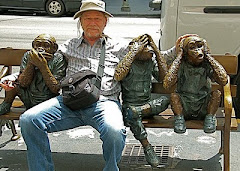 |
| Baseball at dusk: a Cape ritual 2010 CC Jean Stimmell |
In my
last blog entry, I included this quote from Henry Beston , a quote I think very
important:
A human life, so often likened to a spectacle upon a stage, is
more justly a ritual. The ancient values of dignity, beauty, and poetry which
sustain it are of Nature's inspiration; they are born of the mystery and beauty
of the world.” *
How profound and so true! Our lives gain
immeasurable substance and meaning when we view them as ritual – rather than
just a stage act. But not any ritual will suffice, only meaningful ones
reflecting the majestic rhythms of Mother Nature herself. In the quote that follows, Beston poetically
describes his feelings of gratitude and reverence for the gift nature bestows upon him, while immersed in her magnificent seasonal rituals during his year on
the outer Cape:
“My year
upon the beach had come full circle; it was time to close my door. Seeing the
great suns, I thought of the last time I marked them in the spring, in the
April west about the moors, dying into the light and sinking. I saw them of old
about the iron waves of black December, sparkling afar. Now, once again, the
Hunter rose to drive summer south before him, once again autumn followed on his
steps. I had seen the ritual of the sun; I had shared the elemental world.
Wraiths of memories began to take shape. I saw the sleet of the great storm
slanting down again into the grass under the thin seepage of moon, the
blue-white spill of an immense billow on the outer bar, the swans in the high
October sky, the sunset madness and splendour of the year’s terns over the
dunes, the clouds of beach birds arriving, the eagle solitary in the blue. And
because I had known this outer and secret world, and been able to live as I had
lived, reverence and gratitude greater and deeper than ever possessed me,
sweeping every emotion else aside, and space and silence an instant closed
together over life. (pp.215-6) *
Henry Beston was far ahead of his
time, although writing almost 100 years ago, he could acutely feel the pain to
the Earth for the wounds we had already inflected on Her – wounds now, of
course, immeasurably worse, endangering most of the species on earth, including
us two-legged ones.
In my next installment I will note
how Henry Beston, along with another visionary, Carl Jung, writing in this same
period of time, could appreciate the folly on the other side of the equation:
about how we in the West, immersed in our individualistic, materialistic
culture are in complete denial about the centrality of nature to our very
existence; we have been impoverished by a collective loss of memory of anything
more important and bigger than we are.
As Bonnie Bright has written, “As a
society, we have become dislocated in time and disconnected from place, leaving
us rootless, transient, and opting for sensationalism instead of spirituality;
superficiality instead of soul.”**



























